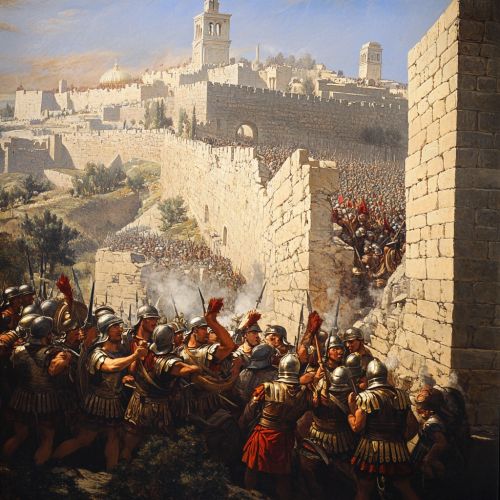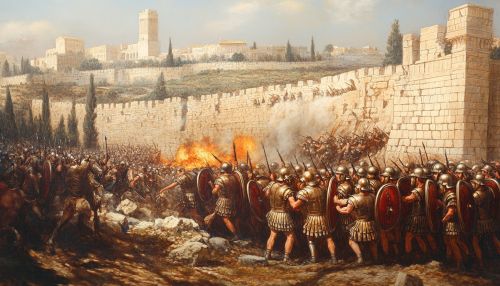First Jewish-Roman War
Background
The First Jewish-Roman War, also known as the Great Revolt, was a significant conflict between the Roman Empire and the Jewish population of Judea. It took place from 66 to 73 CE and marked a pivotal moment in Jewish history. This war was the first of three major Jewish revolts against the Roman Empire, followed by the Kitos War (115-117 CE) and the Bar Kokhba Revolt (132-136 CE).
Causes of the War
The causes of the First Jewish-Roman War were multifaceted, involving religious, social, and political tensions. The Roman occupation of Judea had created a volatile environment, exacerbated by heavy taxation, religious restrictions, and the imposition of Roman culture. The Zealots, a radical Jewish sect, played a crucial role in inciting rebellion, advocating for the expulsion of the Romans and the establishment of an independent Jewish state.
Outbreak of the War
The war began in 66 CE when the Roman procurator Gessius Florus seized large sums of money from the Temple in Jerusalem, leading to widespread protests. The situation escalated when Roman forces attempted to suppress the unrest, resulting in violent clashes. The Jewish rebels, led by the Zealots, managed to capture Jerusalem and expel the Roman garrison.
Major Battles and Sieges
Siege of Jerusalem
The Siege of Jerusalem was one of the most significant events of the First Jewish-Roman War. The Roman general Vespasian and his son Titus led the Roman legions in a protracted siege of the city, which lasted from 70 to 73 CE. The siege culminated in the destruction of the Second Temple, a catastrophic event for the Jewish people.


Battle of Beth Horon
The Battle of Beth Horon was another crucial engagement during the war. Jewish forces, under the command of Simon Bar Giora, ambushed and defeated a Roman legion, inflicting significant casualties. This victory boosted the morale of the Jewish rebels and prolonged the conflict.
Siege of Masada
The Siege of Masada was the final act of the First Jewish-Roman War. The fortress of Masada, held by Jewish rebels known as the Sicarii, was besieged by Roman forces led by Lucius Flavius Silva. The siege ended in 73 CE with the mass suicide of the defenders, who chose death over surrender.
Consequences
The First Jewish-Roman War had profound and lasting consequences for the Jewish people and the Roman Empire. The destruction of the Second Temple marked the end of the Second Temple period and led to significant changes in Jewish religious practices. The war also resulted in the widespread dispersion of the Jewish population, known as the Jewish diaspora.
